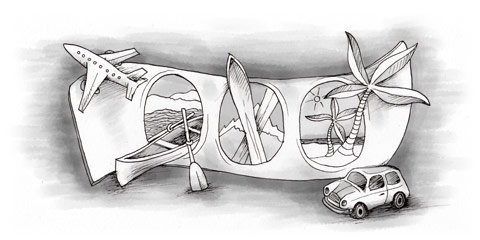Public transport is very cost effective in Russia and even more importantly trains run frequently and usually on time! Both Moscow and St Petersburg have comprehensive public transport networks, and even in smaller cities and towns getting around is not too difficult.
Metro
The metro is the most popular form of transport in the capital - the Moscow metro system serves 7 million passengers a day. The St Petersburg system serves 2 million, a lot of people considering the network only has five lines. As well as Moscow and St Petersburg there are underground metro systems in Kazan, Nizhny Novgorod, Novosibirsk, Samara and Yekaterinburg.
There are many different ticket options when using the Moscow metro but a single journey costs just 30 rubles (€0.70), so it won’t break the bank while you figure out the best option for you. Tickets can be purchased at the KACCA (ticket booth) simply by holding up the numbers of fingers that correspond with the number of journeys you need.
In St Petersburg the metro ticketing system works using tokens or ‘zheton’. A single journey with one token costs about the equivalent of €0.75. Tickets can be bought from machines in the station; some allow you to choose the number of tickets you require, others only allow you to by a set amount and only accept 100 ruble notes, they do however give change. If in doubt, tickets can be bought from the ticket windows.
Beware though, the signs and announcements in metro stations and on the trains are usually only in Russian, but it is easy to find maps of the network in English and Russian.
Bus
Overground transport can be daunting in Russia but in recent years the competition between public and private companies running the bus services have made it more efficient and cheaper. A lack of centralised organisation has, however, rendered it difficult to find information regarding timetables online, so it is best just to check at the bus stops. Using buses is an excellent way to get a feel for where you are, it allows you to see places that the metro doesn’t reach.
Bus tickets in Moscow can be bought on the bus, but the driver will rarely give you change, so be prepared to overpay. Alternatively if you are planning to stay for a while, buying a book of tickets will be more cost effective as the more tickets you buy the cheaper each one costs. These can be bought at kiosks with the sign “proezdnyue bilety”; they are usually situated just inside or outside the metro stations. In St Petersburg, however, bus fares are paid to the conductor on the the bus.
Both cities now have their own travel cards that combine use of metro, bus and the trolley cars. If you are moving to one of the cities, it will probably be most effective to invest in one of these cards. In St Petersburg they are called Podorozhnik cards and in Moscow, Troika cards.
Follow the link for more information about public transport and up to date ticket information in either Moscow or St Petersburg
Taxi
You cannot hail a cab off the street in Russia, they have to be called in advance. Fares are not measured on a meter so it is important to agree a price when booking or before setting off. Foreigners will often incur a higher starting rate, so it is a good idea to know approximately how much your journey should cost. It shouldn’t cost more than 500 rubles to get from one side of a city to the other. However, factoring in the fact than non-Russian speakers will probably pay a premium, this could double to 1,000 rubles.
Taxi drivers in Russia rarely speak English so it would be a good idea to get a local to book your taxi or to write down your destination in Russian for you.
Local trains
Serving the areas around the city centres, the local train services usually connect with the metro or other public transport systems. Not all trains stop at all stations at all times during the day, as the system operates both slow and express services, so it is important to check the timetable in advance.

